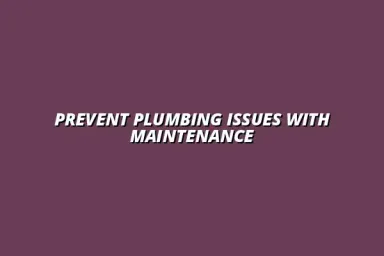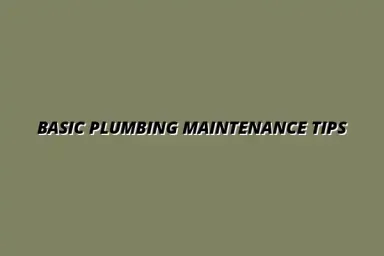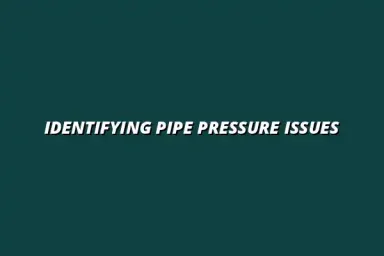Understanding the Importance of Regular Pipe Descaling
Regular pipe descaling is crucial for maintaining the efficiency and longevity of your plumbing system. Over time, limescale can accumulate in pipes, leading to a range of issues that can affect your home's water supply. Understanding how this build-up occurs and its impacts can help you take proactive measures to keep your plumbing in top shape!
Neglecting to descale your pipes may result in decreased water flow, increased energy costs, and even damage to your plumbing fixtures. By regularly addressing limescale issues, you can ensure a smoother water flow, better water quality, and ultimately save on costly repairs down the line. For more comprehensive plumbing maintenance advice, check out these essential plumbing maintenance tips for homes. Let’s dive deeper into the impact of limescale build-up and the benefits of keeping your pipes clear.
The Impact of Limescale Build-Up on Plumbing Systems
Limescale builds up in pipes due to the presence of calcium and magnesium in hard water. When water heats up and cools down, these minerals precipitate out and form hard deposits on the pipe walls. Over time, this can narrow the flow of water, leading to a host of plumbing issues.
Here are some key points about the impact of limescale on plumbing systems:
- Reduced Water Flow: Limescale can significantly decrease the water flow rate, making taps and showers less effective.
- Increased Pressure: Blockages from limescale can cause pressure to build up, leading to pipe bursts.
- Energy Inefficiency: Hot water systems have to work harder to push water through blocked pipes, increasing energy costs.
How Limescale Forms in Pipes
Limescale formation is a natural process caused by hard water. When hard water travels through pipes, it leaves behind mineral deposits as it evaporates or cools. These deposits can create thick layers over time, especially in areas where water stagnates. Learning how to regularly clean your water pipes can significantly reduce this issue.
To summarize, limescale forms through:
- Evaporation of water, leaving minerals behind.
- Temperature changes that encourage mineral precipitation.
- Stagnant water conditions that allow deposits to settle.
The Consequences of Neglected Limescale
If left unaddressed, limescale build-up can lead to serious plumbing issues. For instance, reduced water flow can affect daily activities like showering, washing dishes, and doing laundry. Moreover, the pressure issues caused by limescale can result in leaks or bursts, leading to costly repairs. Preventing tree roots from damaging your pipes is another important aspect of preventative maintenance.
Some common consequences include:
- Frequent Clogs: Blockages can become a regular nuisance.
- Damage to Appliances: Hard water can shorten the lifespan of appliances like dishwashers and water heaters.
- Higher Utility Bills: Increased energy consumption due to inefficient water heating.
Benefits of Regular Pipe Descaling
Regularly descaling your pipes can save you a lot of trouble and expense. By removing limescale build-up, you'll notice several benefits that improve both your plumbing's efficiency and your overall home experience.
Here are some significant advantages of maintaining regular descaling:
- Improved Water Flow and Pressure: Clear pipes allow water to flow freely, enhancing pressure and performance.
- Extended Lifespan of Plumbing Fixtures: Removing limescale can prevent damage, extending the life of your pipes and fixtures.
- Enhanced Water Quality and Taste: Clean pipes result in better-tasting water without the metallic or chalky taste often caused by limescale.
Improved Water Flow and Pressure
One immediate benefit you will notice after descaling is an improvement in water flow and pressure. This can make your showers more enjoyable and your faucets more effective. Without the hindrance of limescale, water can travel through your pipes freely!
Increased water pressure can also enhance the performance of appliances that rely on water, such as washing machines and dishwashers. This not only improves their functionality but also encourages more efficient use of water. Regular checks on your bathroom water heater are also crucial for maintaining water pressure.
Extended Lifespan of Plumbing Fixtures
Descaling your pipes regularly can significantly extend the lifespan of your plumbing fixtures. When limescale accumulates, it can cause wear and tear on pipes, leading to leaks and breaks. By keeping your pipes clean, you reduce the risk of needing expensive repairs or replacements.
Additionally, healthy plumbing contributes to lower maintenance costs. Investing a little time and effort into descaling can save you big bucks later on!
Enhanced Water Quality and Taste
The quality of your water can be adversely affected by limescale build-up. You might notice strange tastes or odors, which can be unappealing. Regular descaling helps ensure your water remains clean and fresh.
Moreover, good water quality is vital for drinking, cooking, and bathing. By maintaining clear pipes, you can enjoy healthy, great-tasting water every day! Preventing pipe corrosion is a key part of ensuring good water quality.
Effective Techniques for Descaling Your Pipes
Descaling pipes is essential for maintaining a healthy plumbing system. There are many techniques available, ranging from simple DIY methods to professional services. In this section, I'll explore some effective techniques you can use to keep your pipes clear and functioning properly!
DIY Pipe Descaling Methods
If you're a hands-on kind of person, DIY descaling can be a cost-effective solution. Among the various methods, using common household items like vinegar and baking soda stands out for its simplicity and effectiveness. Not only are these ingredients affordable, but they are also safe for your plumbing!
Using Vinegar and Baking Soda
Vinegar and baking soda create a powerful combination for removing limescale. Here’s how you can use them:
- Step 1: Pour about a cup of baking soda down the affected pipe.
- Step 2: Follow with a cup of vinegar.
- Step 3: Cover the drain and let the mixture sit for about 30 minutes.
- Step 4: Flush the pipes with hot water.
This method not only helps in descaling but also leaves your pipes smelling fresh! Always remember to use caution and ensure proper ventilation while working with these ingredients.
Commercial Descaling Solutions: Pros and Cons
Commercial descaling products can be another option if you prefer a more straightforward approach. Here are some pros and cons to consider:
- Pros:
- Quick and effective against stubborn limescale.
- Specifically formulated for plumbing systems.
- Easy to use with clear instructions.
- Cons:
- Some products may contain harsh chemicals.
- Can be more expensive than DIY methods.
- Requires careful application to avoid damage.
Professional Descaling Services
In some cases, it might be best to call in a professional plumber. If your pipes are heavily scaled or if you've tried DIY methods without success, a professional service can provide thorough descaling. They have access to specialized tools and expertise that can effectively tackle even the most challenging limescale issues! For reliable plumbing services in Birmingham, consider contacting a plumber in Billesley, Birmingham.
When to Hire a Professional Plumber
Knowing when to hire a professional can save you time and frustration. Here are some signs that indicate it’s time to call in an expert:
- Persistent low water pressure.
- Frequent clogs despite regular maintenance.
- Unusual noises from the plumbing system.
- Signs of water leaks or damage.
It's worth investing in professional help if you notice these issues, as they can prevent more severe plumbing problems down the line.
Understanding the Costs Involved in Professional Descaling
Before hiring a plumber, it’s essential to understand the potential costs. Typically, the cost of professional descaling can vary based on several factors:
- Extent of limescale buildup.
- Location and accessibility of pipes.
- Type of descaling method used.
- Hourly rates of the plumber.
On average, you might expect to pay between $100 to $300, depending on these factors. Always ask for a detailed estimate before proceeding!
Maintaining Your Plumbing System Post-Descaling
Once your pipes have been descaled, it’s crucial to take some preventive measures to keep them in good shape. Doing so will ensure that your plumbing system remains free from limescale buildup for a long time. Let’s look at some effective strategies!
Preventive Measures to Avoid Future Limescale Buildup
To keep your plumbing system in optimal condition, consider adopting these preventive measures:
- Install a water softening system.
- Regularly test your water quality.
- Schedule routine maintenance checks.
Implementing these practices can significantly reduce the risk of limescale accumulation and keep your plumbing running smoothly. Remember to flush your water heater regularly as part of your maintenance routine.
Water Softening Solutions
Water softeners work by removing minerals like calcium and magnesium from your water. These minerals are the primary culprits behind limescale buildup. By using a water softener, you can enjoy:
- Improved water quality.
- Enhanced efficiency of appliances.
- Less frequent descaling needs.
These benefits can lead to long-term savings and a healthier plumbing system!
Regular Maintenance and Inspections
Routine maintenance is essential for preventing future limescale buildup. Consider these simple steps:
- Inspect pipes for leaks or damage regularly.
- Flush your water heater annually to remove sediment.
- Keep an eye out for changes in water flow and quality.
By staying proactive, you can catch potential issues before they escalate, saving time and money in the long run!
Final Thoughts on Regular Descaling of Pipes
Descaling your pipes is an essential practice that ensures the longevity of your plumbing system. Regular maintenance not only improves water flow and quality but also helps prevent costly repairs. Keep an eye on the signs of limescale accumulation to maintain a healthy plumbing environment!
Summarizing Key Points on Descaling
Here’s a quick recap of the essential points regarding pipe descaling:
- Regular descaling prevents limescale buildup.
- Both DIY and professional methods are effective.
- Preventive measures can help maintain plumbing health.
By following these guidelines, you can ensure that your plumbing system functions at its best for years to come!
Encouraging Proactive Plumbing Health Practices
Maintaining your plumbing system should be a priority! I encourage everyone to adopt proactive practices, from regular inspections to using water softeners. Taking these small steps can lead to significant long-term benefits for your home’s plumbing! Remember to consult a professional for any complex plumbing issues or if you need further advice on maintaining your pipes. For instance, you might want to explore options for preventing or resolving any issues related to tree roots damaging pipes.

 Kiran Almasi
Kiran Almasi

